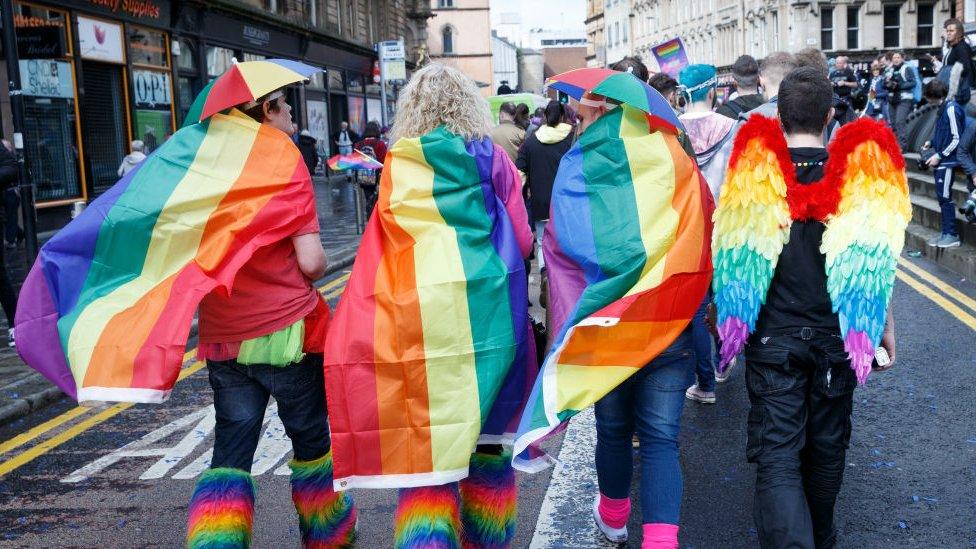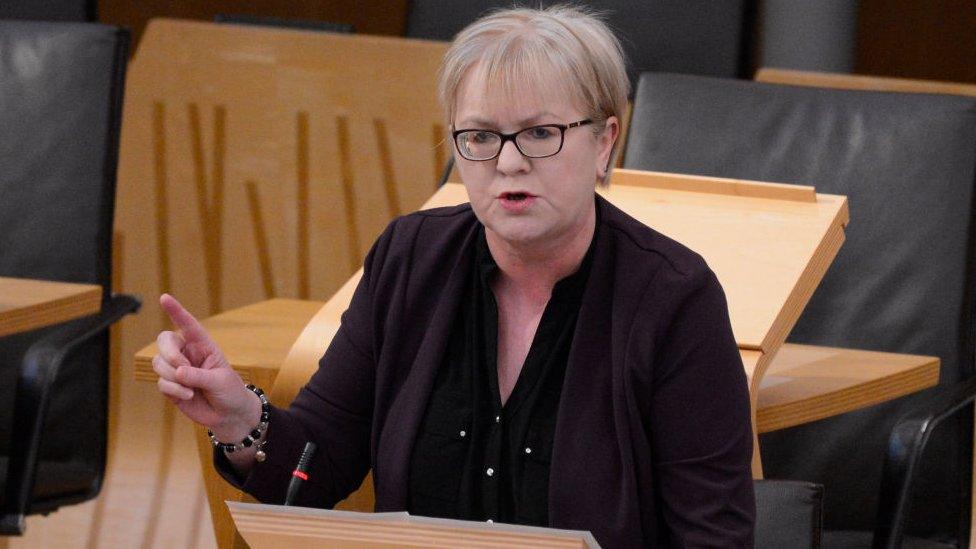Scotland's Hate Crime Bill faces final vote in Holyrood
- Published

The bill aims to give protection for individuals around their sexuality and gender identity
A new law on hate crime faces its final vote at Holyrood later.
First introduced last April, the Hate Crime Bill has attracted controversy over its "lack of clarity" and a perceived impact on free speech.
MSPs will debate more than 40 amendments to the bill and new protections for freedom of expression.

Stirring up hatred
The bill consolidates existing hate crime laws but also creates a new offence of "stirring up hatred" on the grounds of religion, sexual orientation, age, disability and transgender identity.
The offence already exists for race under the 1986 Public Order Act.
Last year the first draft of the bill was attacked over its perceived low prosecution threshold - targeting behaviour deemed to be "likely" to stir up hatred regardless of intention.
This led to the Law Society of Scotland criticising the bill for a "lack of clarity". Religious and cultural groups also raised concerns about its impact on free expression.
Since then, the Scottish government has removed the "likely" element of the offence, with the exception of race.
It has also proposed a freedom of expression clause that protects "discussion or criticism of matters relating to age, disability, sexual orientation, transgender identity and variations in sex characteristics".
Justice Secretary Humza Yousaf believes the new measures provide a "very high threshold" for prosecution.
Some religious and women's rights groups still have concerns about the proposals, but the Scottish Conservatives are expected to support the amendment.

Conservative MSP Adam Tomkins has proposed an amendment to protect freedom of speech
Privacy concerns
Scottish Conservative MSPs Adam Tomkins and Liam Kerr have proposed amendments that they say will protect free speech in private - something the new law doesn't offer.
Their amendments are related to the so-called "dwelling defence" that already exists in relation to stirring up racial hatred.
Mr Tomkins - who is also convenor of Holyrood's justice committee - said his move to protect speech "wholly in private" is in line with the right to respect for privacy and a family life.
He told BBC Scotland: "I'm not seeking to insulate everything that happens in the home.
"But I am seeking to say there is a zone of privacy that is protected by European human rights law. We all have the right to respect for our private and family life.
"If something is happening wholly in private, with no public element at all, then it should be safeguarded from the Hate Crime Bill."
Mr Yousaf said: "If you are sitting round the dinner table having a debate about transgender identity and your view is that a man can't transition to a woman, that won't get you prosecuted.
"If your behaviour is found to be threatening or abusive by a reasonable person and it was intended to stir up hatred - and that can be proven beyond reasonable doubt - then you will be prosecuted."

Justice Secretary Humza Yousaf says the bill provides a "very high threshold" for prosecution
Sex
Labour MSP Johann Lamont is also seeking an amendment that will see sex added as a protected characteristic under the bill.
She said: "The group that everyone would recognise most routinely face hatred in their everyday lives is women.
"We know that women are murdered by their partners, face domestic abuse and violence, and are discriminated against in all sorts of ways. Yet they are not featured in this legislation. I simply think that's wrong.
"Even if the legislation is only about giving signals about how we should treat each other, then women should be at the heart of that."
She added: "My fear is that the legislation being brought in is well-meaning and has signalled something. But legislation has to be about more than just signals - it has to be about consequences too."
The Scottish government is likely to reject the proposal.

Labour's Johann Lamont is seeking an amendment to have "sex" added as a protected characteristic
Gender Identity
Ms Lamont is also seeking further changes under the freedom of expression that would protect people for "asserting, advancing or rejecting any proposition ... that sex is a physical, binary characteristic that cannot be changed".
Another change would be to remove people who "cross-dress" from the definition of transgender identity.
That move would also be rejected by the Scottish government and is not supported by transgender activists.
Becky Kaufmann, of the Scottish Trans Alliance, said: "If it is not a crime to commit a hate crime against someone because they cross-dress, a perpetrator could very legitimately go to court and argue, 'If I had known that that was real trans person, I would never have done that'.
"It is a very blatant and very obvious loophole that means all protections for trans people could be removed, simply by a person claiming they thought they were a cross-dresser."